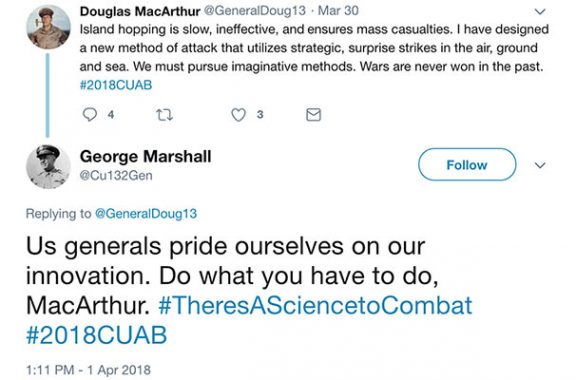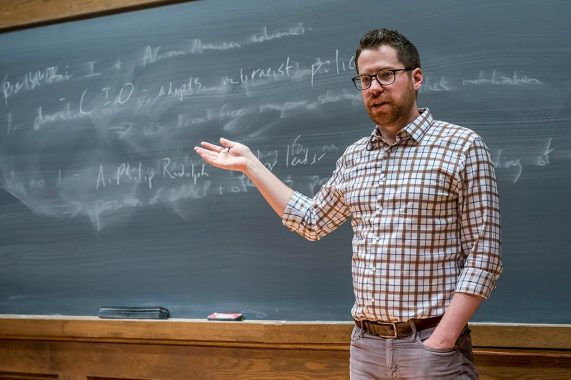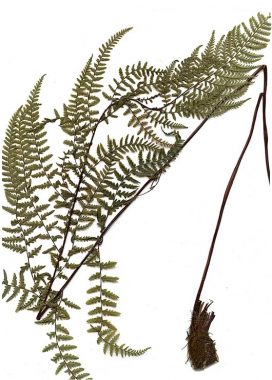Hidden Treasure
When Reader’s Digest was looking to create a list of the world’s most famous lost treasures, they turned to Robert Garland, the Roy D. and Margaret B. Wooster Professor of the classics. Garland offered one of his favorite pieces of missing history: a 2,000-year-old menorah. In 70 AD, the Romans swiped the sacred sconce from the Temple of Jerusalem. “We know they brought it to Rome,” Garland told Reader’s Digest, because it’s “depicted on the frieze on the Arch of Titus in the Forum.” Some say it was brought to the Temple of Peace in Rome, but after that, its trail runs cold.
Professor and student publish paper on transitions to adulthood
How do kin support young women in their transitions to adulthood? Research by sociology professor Janel Benson and Anastassia Bougakova ’16 shows the complex ways that kin networks (including relatives and familial adults outside of the nuclear family) help young women during this critical time.
By drawing on qualitative and quantitative data, Benson and Bougakova were better able to understand the role that kin networks play in the lives of women of different family structures and economic statuses.
The article, “Kin Networks and Mobility in the Transition to Adulthood,” was recently published in Advances in Child Development and Behavior.
Past research has shown that family structure can accelerate or decelerate transitions into adulthood. Benson and Bougakova found that growing up in a home without two biological parents is not always associated with an accelerated transition into adulthood. Emotional and financial support from adults outside the nuclear family created a sense of stability for young women growing up in homes without two biological parents.
The researchers also found that, in turn, young women who received support from their extended kin networks dedicated more time to their kin. Young women who provided caregiving and financial support to their families considered themselves adults and were more likely to work and live independently.
“Extended kin networks are not inferior to nuclear family structures. The way that extended kin are both supporting and hindering young women’s transitions into adulthood is complex and dependent on each situation,” Bougakova explains. “A lot of these women are making important transitions into adulthood because of the support they receive from their extended kin. They’re not necessarily hurt by the fact that they may not have a complete nuclear family or that their nuclear family might have less resources; extended kin really fill that gap.”
In writing the article, Benson and Bougakova drew upon survey data and interviews with young women from the Philadelphia Educational Longitudinal Study. Benson helped conduct this research during her graduate study at the University of Pennsylvania.
Bougakova first did research with Benson during a faculty-initiated research fellowship program in summer 2014. During that summer, Benson suggested that each student develop a research question using the Philadelphia Educational Longitudinal Study data. While Benson’s research focus is on sources of risk and resiliency from adolescence to the transition to adulthood, Bougakova’s research question about kin support networks was the genesis of the article.
“It became clear that this was a project Anastassia was passionate about,” Benson says.
From then, Benson treated Bougakova like a graduate student. Bougakova worked independently and submitted her progress to Benson for feedback. Together, they presented their research at the Society for the Longitudinal Life Course Studies Conference in Dublin, Ireland, in 2015. Bougakova was a Benton Scholar while at Colgate; the scholarship program helped to fund her trip to the conference.
“Getting to work on a real research project by asking my own question and forming my own conclusions as early as sophomore year was awesome,” Bougakova says.
— Melanie Oliva ’18
Balmuth teaching award times two
For the first time in the history of the Jerome Balmuth Award for Teaching and Student Engagement, two professors have been honored. This year’s recipients were Chris Vecsey and Lourdes Rojas-Paiewonsky.
“In the face of an exceptional collection of rich and textured letters of support, the award committee made an extraordinary and unprecedented decision to select two faculty recipients this year,” Provost and Dean of the Faculty Tracey Hucks ’87, MA’90 says. “That Colgate is home to such outstanding educators would have come as no surprise to our friend and colleague Professor Jerry Balmuth.”
Rojas-Paiewonsky is the Charles A. Dana Professor of romance languages and literatures and Africana and Latin American studies. Her research interests — and her many published works — revolve around feminist literary criticism, Latin American and Spanish women writers, Caribbean literature, and feminism and politics in contemporary Latin America. Before launching her 34-year teaching career at Colgate, Rojas-Paiewonsky earned her BA and MA at the University of California at La Jolla. She received her PhD from SUNY Stony Brook.
Vecsey is the Harry Emerson Fosdick Professor of the humanities and Native American studies in the Department of Religion, which he also chairs. A powerful presence in Colgate’s classrooms for the last 35 years, he is the author and editor of more than a dozen books and countless articles on topics related to traditional American Indian religions, American Indian Christianity, American music history, journalism, and religion. Vecsey earned his BA and MA at Hunter College and his PhD at Northwestern University.
“Our Balmuth award winners represent nearly 70 years of teaching history at this university,” Hucks says. “Professor Rojas-Paiewonsky and Professor Vecsey have been and continue to be crucial participants in Colgate’s liberal arts mission.”
The Balmuth award was created in 2010 through a gift from Mark Siegel ’73 and has now recognized the distinctively successful and transformative teaching, regardless of methodology, of 10 Colgate faculty members.
Blast from the past
Franklin Roosevelt, Edward R. Murrow, and Winston Churchill have all taken to Twitter — ditching the traditional microphone and podium — to post history-making statements.
Through a class project for Advent of the Atomic Bomb, students have been role playing and making the most of their characters on the social media platform. From the devastatingly serious to tongue-in-cheek, posts under the names of major players in this era serve as a timeline for the nuclear events.
This is the third semester Karen Harpp, professor of geology and peace and conflict studies, has instructed students to use this modern tool in order to become better acquainted with the past. Take a moment to step into the Twitter time machine:

What’s in a name
It’s common to name your child after a mentor, but what about a plant? Weston Testo ’12 recently named a newly discovered species of fern after biology professor Eddie Watkins. “He was an incredible mentor, not just about ferns, but also how to navigate college,” Testo says. He also named the fern, called Pityrogramma x watkinsii, after Watkins because of the professor’s role in the global research community, especially in Costa Rica, where the fern was found. In college, Watkins introduced Testo to ferns in the country and taught him how to identify the plants. Testo and Watkins have published seven papers together, four of which were during Testo’s undergraduate years.
Get to Know: Political Science Professor Sam Rosenfeld

Photo by Mark DiOrio
The modern political arena is marred by increasing animosity among parties — a situation that has been escalating since World War II, with social issues at the forefront of the debate. How did we arrive at this point and, more importantly, who is responsible?
Sam Rosenfeld, assistant professor of political science who teaches courses on political and party development, answers these questions in his new book, The Polarizers: Postwar Architects of Our Partisan Era. Rosenfeld traces the development of the “ideologically sorted two-party system” in the United States since the mid-20th century.
Ideological activists — politically involved citizens and groups who demand policies from representatives — have influenced our political system and are primarily responsible for its shifting landscape, Rosenfeld explains.
“[Activists] worked deliberately to reshape the parties and reorient how the parties worked in order to make them vessels for issue-driven and ideological politics,” he says. “Those people [as noted in the title] are the protagonists of the book.”
Written for a scholarly audience, The Polarizers encourages readers to reconsider the modern political party. Rosenfeld hopes that people are able to acknowledge the dysfunction in the current political system while also “thinking about [the] benefits — or what’s essential — in institutions like parties that peaceably organize conflict in democratic societies.”
Parties are necessary for regulating democracy, he argues. “It’s important for Americans to think about parties as not just punching bags … or these demonic forces that need to be tamed or eliminated, but really essential.”
An 8-year writing process, The Polarizers began as Rosenfeld’s dissertation while he was working toward his PhD in history at Harvard University. Having grown up in a family of academics, he pursued his interest in recent American history and political science after a stint as a journalist for The American Prospect magazine in Washington, D.C.
Prior to coming to Colgate last fall, Rosenfeld taught at Wesleyan University in Middletown, Conn., and Hamilton College in Clinton, N.Y., where he now resides.
“There’s a great kind of open, gracious attitude to students and faculty interactions here,” he says of Colgate.
With The Polarizers gaining widespread media attention, Rosenfeld has widened his circle. He recently published an op-ed in the New York Times and an article in the Boston Review, and among his many appearances, he has been a guest on The Majority Report and the New Books Network podcasts.
“You’ve got to savor [the attention] when it happens,” Rosenfeld jokes. “But the initial spate of discussion has been a delight.”
— Julia Klein ’19







